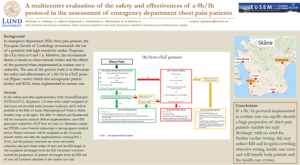A multicenter evaluation of the safety and effectiveness of a 0h/1h protocol in the assessment of emergency department chest pain patients

Background
In emergency department (ED) chest pain patients, the European Society of Cardiology recommends the use of a 0h/1h high-sensitivity cardiac Troponin (hs-cTn) protocol. However, the recommendation is based on observational studies and the effects of the protocol when implemented in routine care is unknown. The aim of this study is to determine the safety and effectiveness of the ESC 0h/1h hs-cTnT protocol, supplemented with clinical assessment and ECG, when implemented in routine careMethods
In this before-and-after implementation study with concurrent controls, all patients ≥18 years with a chief complaint of non-traumatic chest pain and possible acute coronary syndrome (ACS) will be included at the EDs of Skåne University Hospital at Lund and Malmö, Helsingborg Hospital, Ystad Hospital and Kristianstad Hospital in southern Sweden. Patients with STEMI, patients leaving against medical advice and non-Swedish residents will be excluded. The 0h/1h protocol identifies low-risk patients suitable for early discharge home, high-risk patients suitable for immediate hospital admission, and intermediate risk patients suitable for further diagnostic assessment. The protocol will be implemented at the Lund, Helsingborg and Ystad EDs but not at the Malmö and Kristianstad EDs which will be concurrent controls. Patient outcomes will be compared in the 10-month periods before and after the implementation (starting February 1, 2018) both at the protocol-implementing and control hospitals. The primary outcomes are the 30-day rate of acute myocardial infarction/all-cause death and the ED length of stay (LOS) in patients discharged from the ED. Secondary outcomes include the proportion of patients discharged from the ED and of non-ACS-patients admitted to the cardiac care unit, further cardiac testing within 30 days and health care costs.Results
No results are available at this time (April 23, 2018). The main results of the study will be presented in 2019.Conclusion
If a 0h/1h protocol implemented in routine care can rapidly identify a large proportion of chest pain patients suitable for early discharge with no need for further cardiac testing, this may reduce ED and hospital crowding, objective testing, health care costs and will benefit both patients and the health care system.
Arash Mokhtari, Jakob Lundager Forberg, Caroline Hård af Segerstad, Mahin Akbarzadeh Mameghanilar, Ardavan Khoshnood, Ulf Ekelund
2018
European Society for Emergency Medicine, European Emergency Medicine Congress, Glasgow
